New Globalization survey: The public thinks the social and ecological dimension of globalization needs more attention!
The corona crisis has many people worried about the negative side-effects of economic interdependence. Our 2020 Globalization Survey shows that public attitudes toward international trade and investment had already turned more negative by the start of the pandemic.
Design and scope: Online survey in 15 major economies
YouGov conducted our survey in 15 emerging markets and developed economies from late February to mid-March 2020. The results pre-date any further changes in attitudes arising from the coronavirus crisis. We believe that they show some clear underlying tendencies that will almost certainly remain with us well beyond the pandemic. In addition, they might provide a useful point of reference when comparing them with other polling data during or after the crisis.
Finding #1: The pro-globalization bias is on the decline
In 12 of the 15 countries we surveyed, the percentage of people who view globalization as a force for good was still higher than those regarding it as a force for bad. But, in most countries, we see a decline in support for globalization over the past two years. Comparing the current results with data from 2018 shows, for instance, a more positive attitude in Russia (force for good up 6 pp) but more negative in Mexico (good down 8 pp), India (good down 6 pp), Canada (good down 5 pp), and particularly France (good down 12 pp, bad up 16 pp), Japan (good down 6 pp, bad up 13 pp) and Germany (bad up 10 pp).
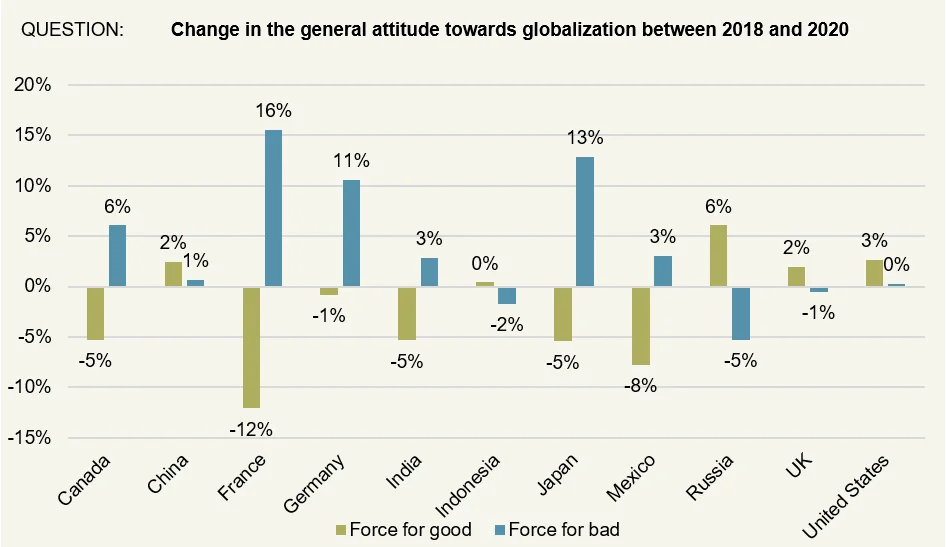
Finding #2: People in emerging economies are more positive about globalization
While we find a general appreciation of the benefits of globalization, trade, and foreign direct investment across our sample, looking closer at the data, we observe sharp differences between those in developed and emerging economies. In the eight emerging economies surveyed, seven take the top spots in our ranking of countries with the most positive view on globalization. The difference in positive answers between emerging markets and developed economies is 27 percent. Not only do people in emerging economies single out globalization as an overall positive phenomenon for economic growth, but they also consider it to be a very important driver of innovation or peace.
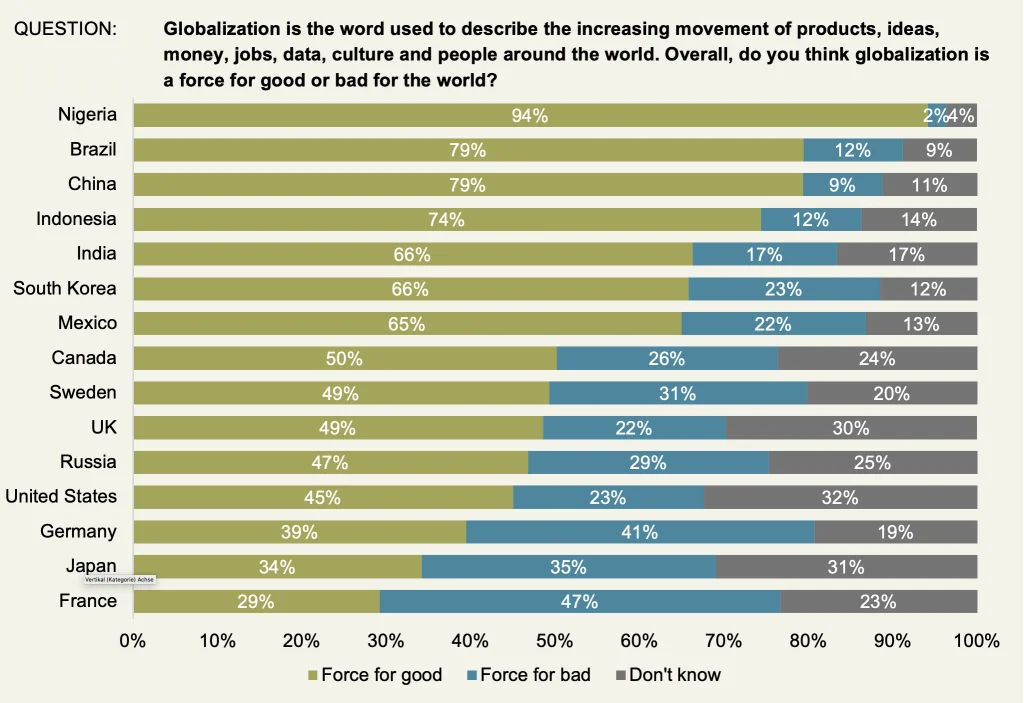
Finding #3: The exchange of ideas is the most popular aspect of globalization
Across our sample of 15 countries, 80 percent of people consider the cross-border movement of ideas a good thing (for example, the transnational diffusion of intellectual property), while less than ten percent consider it a bad thing. This is the highest rating of any aspect of globalization in our survey with the movement of products and culture coming in second and third. The movement of people (migration) receives the lowest rating. Still, even for this least popular dimension of globalization, more consider it a good thing than those holding a negative attitude.
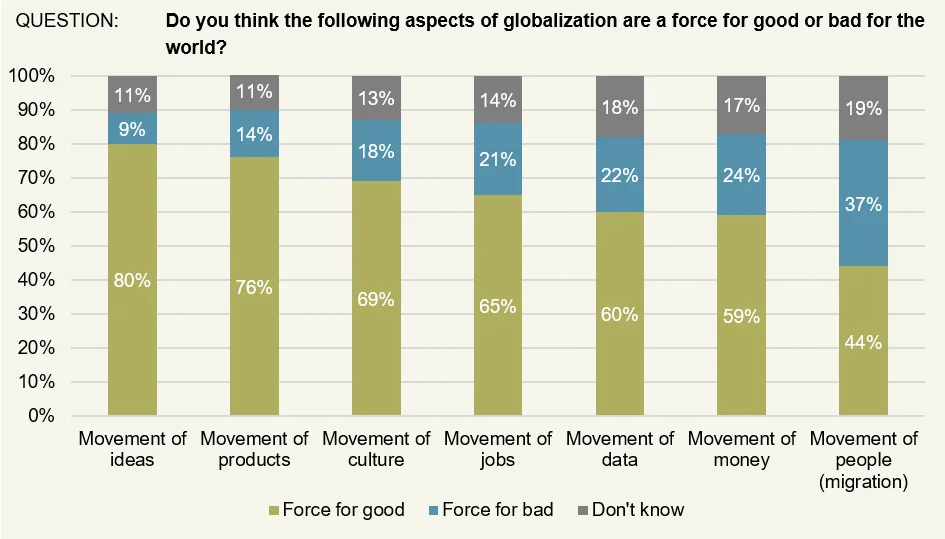
Finding #4: Attitudes to the World Trade Organization are positive
The World Trade Organization (WTO) is currently in a tight spot. Negotiations about the latest major round of trade liberalization have gone nowhere for more than a decade. Reform efforts have stalled, and its arguably most important member state – the US – has been taking a very negative stance toward the organization under the current administration. However, our survey paints a rather positive picture for the WTO. It finds that 62 percent of respondents in our 15-country-sample consider the WTO to be an important institution, with only 14 percent believing it is irrelevant. In comparison to 2018, the overall positive perception about the WTO has increased by six percentage points – up from 56 to 62 percent within two years.
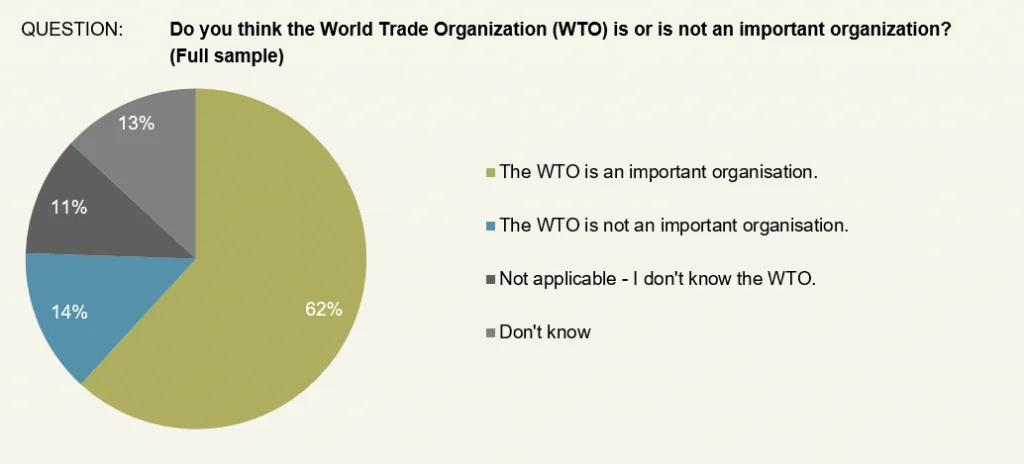
Finding #5: The environment is an important issue in thinking about globalization
The need for solutions and strategies to face the environmental crisis has become more and more relevant in the last couple of years. According to our survey results, people see globalization as damaging for the environment through different mechanisms such as energy consumption, depletion of important resources, air pollution, deforestation, and water contamination. However, when asked whether they would accept forgoing some of the benefits of globalization for the sake of the environment, more than half of interviewees stated that they are instead willing to give up benefits such as product variety, cheaper goods, and international travel to contribute to the fight against climate change.
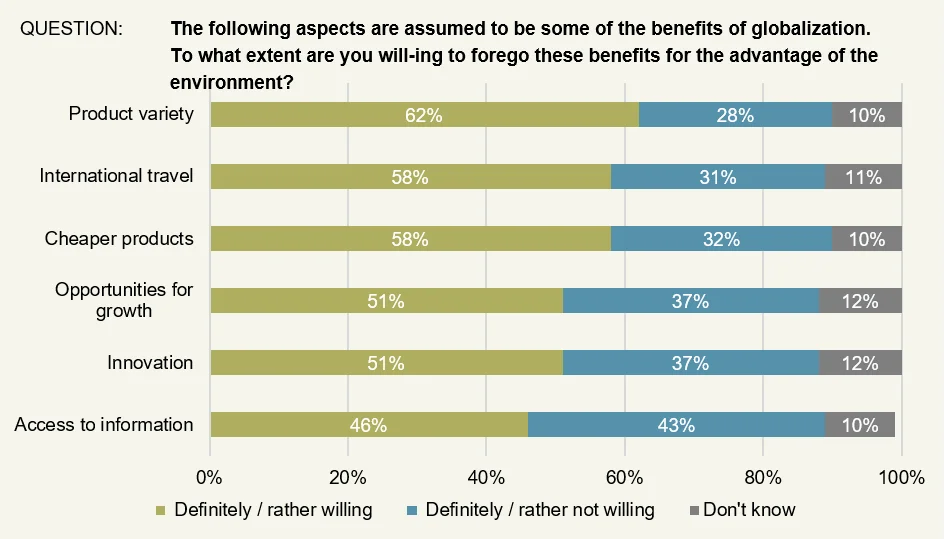
Finding #6: High-skilled, the rich and urban dwellers are considered the winners in globalization
According to the results, people believe that certain groups in society benefit more than others. Responses show that the rich, young, and highly skilled have benefitted more from globalization than others. So, too, do people living in cities and developed countries. When asked whether larger or smaller companies gain from globalization, people believe that larger companies have profited more.
Unlike in previous studies, where respondents pointed to a specific winner group, we found that women and men are believed to have profited equally from globalization.

Finding #7: Strategic industries should remain in national hands
Over recent years, protectionism has been a key word used in the international debate about trade and investment policy. These protectionist tendencies are reflected, to some extent, in the survey answers. Although foreign direct investment (FDI) is perceived as relatively positive for the national economy, foreign takeovers met with disapproval by most survey interviewees irrespective of their country of residence. For instance, when asked about strategic industries, more than 60 percent of respondents in all countries believe that the national government should protect these from foreign takeovers.
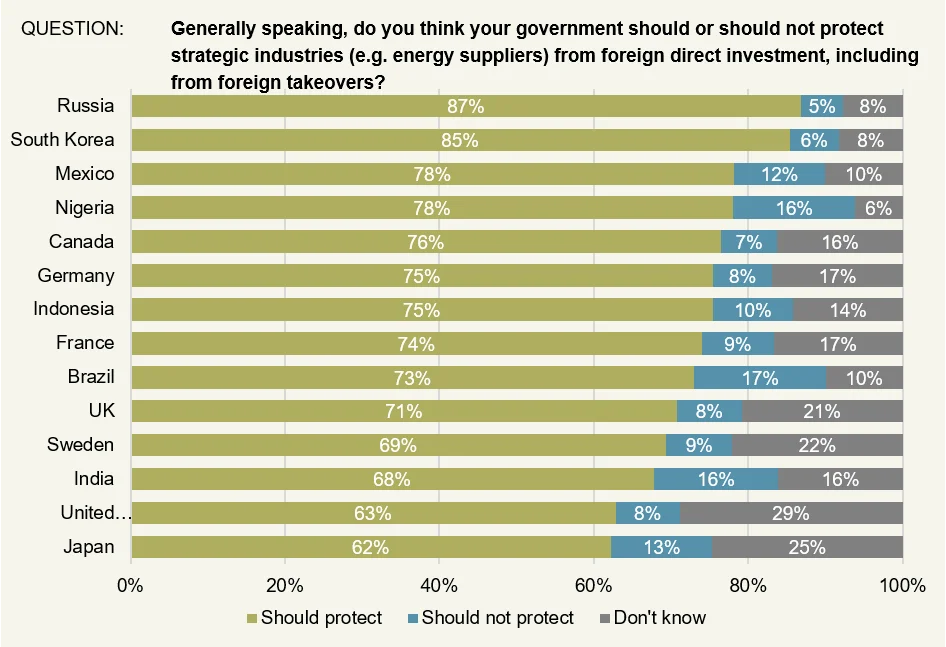
Conclusion: Use the pandemic as a window of opportunity
The corona crisis is likely to exacerbate many of the negative underlying tendencies that we have examined. It is, therefore, all the more critical that we try to use the crisis as a window of opportunity to rethink the governance of globalization at the national, regional, and international levels. Going back to the status quo ante will not and should not be an option. Instead, we need to re-shape the paradigms of globalization and trade in a way that they better rhyme with both environmental and social goals.








